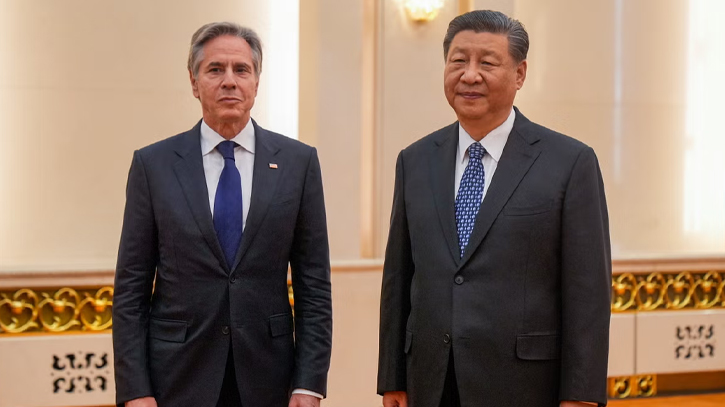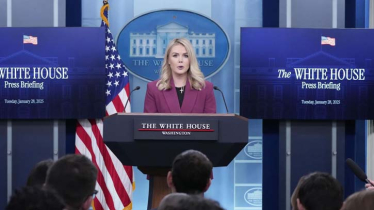
Photo : Collected
U.S. Secretary of State Antony Blinken met Friday with Chinese President Xi Jinping and senior Chinese officials, stressing the importance of "responsibly managing" the differences between the United States and China as the two sides butted heads over a number of contentious bilateral, regional and global issues.
Talks between the two sides have increased in recent months, even as differences have grown. Blinken said he raised concerns with Xi about China's support for Russia and its invasion of Ukraine, as well as other issues including Taiwan and the South China Sea, human rights and the production and export of synthetic opioid precursors.
Blinken sounded a positive note on recent progress made in bilateral cooperation, including in military communications, counternarcotics and artificial intelligence, on which the two sides agreed to start a dialogue on how to reduce risks from the rapidly emerging technology.
"We are committed to maintaining and strengthening lines of communication to advance that agenda, and again deal responsibly with our differences so we avoid any miscommunications, any misperceptions, any miscalculations," he said.
But he stressed that "even as we seek to deepen cooperation, where our interests align, the United States is very clear-eyed about the challenges posed by (China) and about our competing visions for the future. America will always defend our core interests and values."
Notably, he said he raised ongoing concerns about Beijing's supply of materials, including machine tools and microelectronics, to Moscow that President Vladimir Putin is using to boost Russia's defences and its war on Ukraine.
"Russia would struggle to sustain its assault on Ukraine without China's support," Blinken told reporters after his meeting with Xi.
"Fueling Russia's defence industrial base not only threatens Ukrainian security, it threatens European security," he added. "As we've told China for some time, ensuring transatlantic security is a core U.S. interest. In our discussions today. I made clear that if China does not address this problem, we will."
Blinken did not elaborate on how the U.S. would address the matter if China did not, but Washington has imposed large numbers of sanctions against Chinese firms for doing business with countries such as Russia, Iran and North Korea.
He said he urged China to use its influence "to discourage Iran and its proxies from expanding the conflict in the Middle East " and convince North Korea "to end its dangerous behaviour and engage in dialogue."
Russian Defense Minister Sergei Shoigu on Friday hailed military cooperation with China during a meeting with his Chinese counterpart Dong Jun in Kazakhstan's capital, Astana.
"Russian-Chinese military cooperation is an important element in increasing defence capability and maintaining global and regional stability. We regularly conduct joint operational and combat training on land, sea and in the air, and successfully practice combat training missions of varying degrees of complexity," Shoigu said
He said the cooperation is important as "new hotbeds of tension are emerging and old ones are exacerbating. In essence, this is the result of geopolitical adventures, selfish neo-colonial actions of the West."
Blinken also discussed with Xi China's maritime manoeuvres in the disputed South China Sea and reiterated "ironclad" American support for the Philippines, its oldest treaty ally in Asia.
Xi stressed that China and the U.S. must seek common ground "rather than engage in vicious competition."
"China is happy to see a confident, open, prosperous and thriving United States," the Chinese leader said. "We hope the U.S. can also look at China's development in a positive light. This is a fundamental issue that must be addressed."
Earlier, Blinken held lengthy talks with Chinese Foreign Minister Wang Yi and Public Security Minister Wang Xiaohong.
He and Wang underscored the importance of keeping lines of communication open as they lamented persistent and deepening divisions that threaten global security. Those divisions were highlighted earlier this week when U.S. President Joe Biden signed a massive foreign aid bill that contains several elements that the Chinese see as problematic.
"Overall, the China-U.S. relationship is beginning to stabilize," Wang told Blinken at the start of about 5 1/2 hours of talks. "But at the same time, the negative factors in the relationship are still increasing and building and the relationship is facing all kinds of disruptions."
Wang also outlined, without being specific, well-known Chinese complaints about U.S. policies and positions on the South China Sea, Taiwan, human rights and China's right to conduct relations with countries it deems fit, saying "China's legitimate development rights have been unreasonably suppressed."
"China's concerns are consistent," he said. "We have always called for respect of each other's core interests and urge the United States not to interfere in China's internal affairs, not to hold China's development back, and not to step on China's red lines on China's sovereignty, security, and development interests."
Blinken responded by saying that the Biden administration places a premium on U.S.-China dialogue even on issues of dispute. He noted there had been some progress in the past year but suggested that talks would continue to be difficult.
Blinken arrived in China on Wednesday, visiting Shanghai shortly before Biden signed the $95 billion foreign aid package that has several elements likely to anger Beijing, including $8 billion to counter China's growing aggressiveness toward Taiwan and in the South China Sea. It also seeks to force TikTok's China-based parent company to sell the social media platform.
China and the United States are the major players in the Indo-Pacific. Washington has become increasingly alarmed by Beijing's growing aggressiveness in recent years toward Taiwan and its smaller Southeast Asian neighbours with which it has significant territorial and maritime disputes in the South China Sea.
China has railed against U.S. assistance to Taiwan and immediately condemned the aid as a dangerous provocation. It also strongly opposes efforts to force TikTok's sale, although Blinken said this issue did not come up in his talks on Friday.
The bill also allots $61 billion for Ukraine to defend itself from Russia's invasion. China's foreign ministry said the U.S. position on Chinese defence trade with Russia was hypocritical when considered alongside the amount of military assistance Washington is providing to Kyiv.
"It is extremely hypocritical and irresponsible for the U.S. side to introduce a bill for large-scale assistance to Ukraine while making groundless accusations against normal economic and trade exchanges between China and Russia," said ministry spokesperson Wang Wenbin.
"Shifting the blame to China will not solve the problem, nor will it alleviate the passive situation of the parties involved in the Ukraine crisis," he said.
Messenger/Sajib








